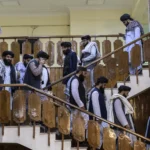Features
Connect with the Stories that Matter!
Connect with the Stories that Matter!

The Taliban’s confrontation with Pakistan reveals a deeper failure at the heart of their rule: an insurgent movement incapable of governing the state it conquered. Bound by rigid ideology and fractured by internal rivalries, the Taliban have turned their military victory into a political and economic collapse, exposing the limits of ruling through insurgent logic.

As the U.S. unwinds decades of technological interdependence with China, a new industrial and strategic order is emerging. Through selective decoupling, focused on chips, AI, and critical supply chains, Washington aims to restore domestic manufacturing, secure data sovereignty, and revive the Hamiltonian vision of national self-reliance. This is not isolationism but a recalibration of globalization on America’s terms.
The collapse of the Turkiye-hosted talks to address the TTP threat was not a diplomatic failure but a calculated act of sabotage from within the Taliban regime. Deep factional divides—between Kandahar, Kabul, and Khost blocs—turned mediation into chaos, as Kabul’s power players sought to use the TTP issue as leverage for U.S. re-engagement and financial relief. The episode exposed a regime too fractured and self-interested to act against terrorism or uphold sovereignty.

The deepening India-Afghanistan engagement marks a new strategic era in South Asia. Beneath the façade of humanitarian cooperation lies a calculated effort to constrict Pakistan’s strategic space, from intelligence leverage and soft power projection to potential encirclement on both eastern and western fronts. Drawing from the insights of Iqbal and Khushhal Khan Khattak, this analysis argues that Pakistan must reclaim its strategic selfhood, strengthen regional diplomacy, and transform its western border from a vulnerability into a vision of regional connectivity and stability.

The recent talks in Turkey, attended by Afghan representatives, exposed the delicate politics of legitimacy and agency in Pakistan-Afghanistan relations. By rejecting the Taliban’s proposal to include the TTP, Pakistan safeguarded its sovereignty and avoided legitimizing a militant group as a political actor, preserving its authority and strategic narrative.